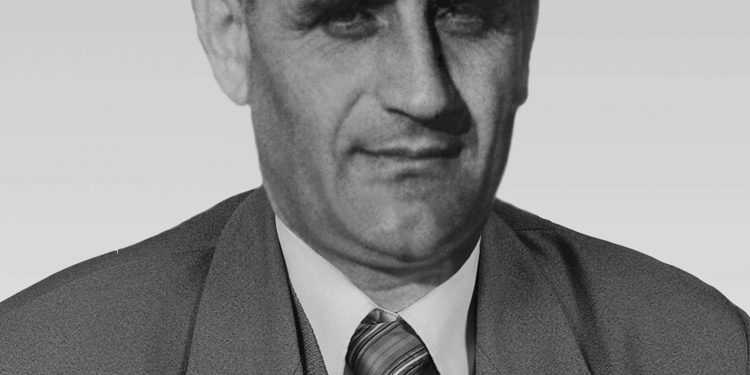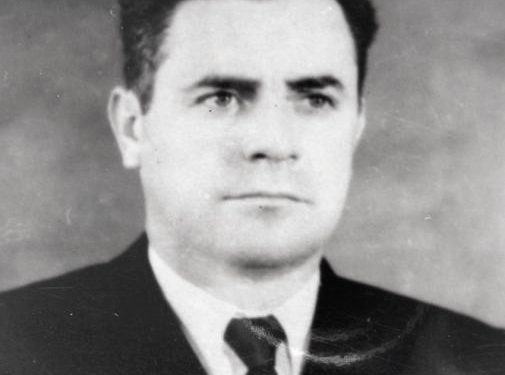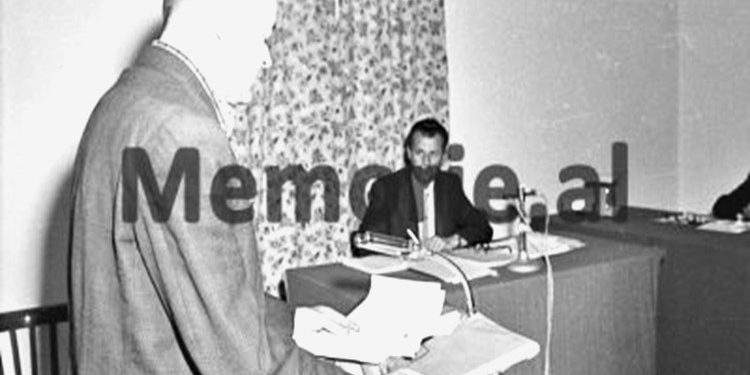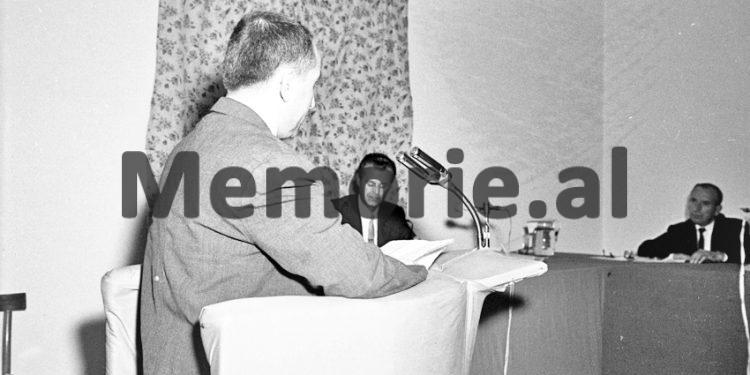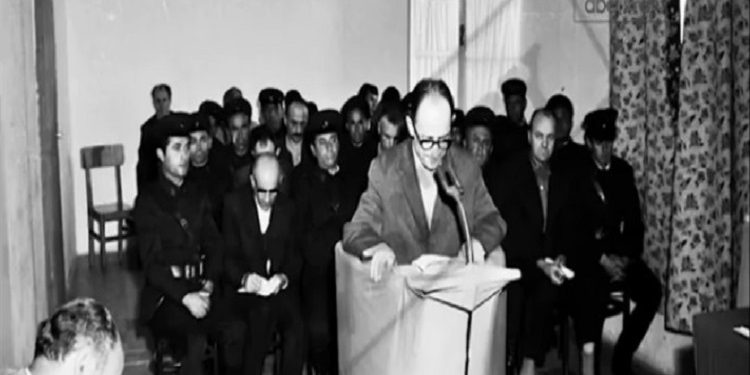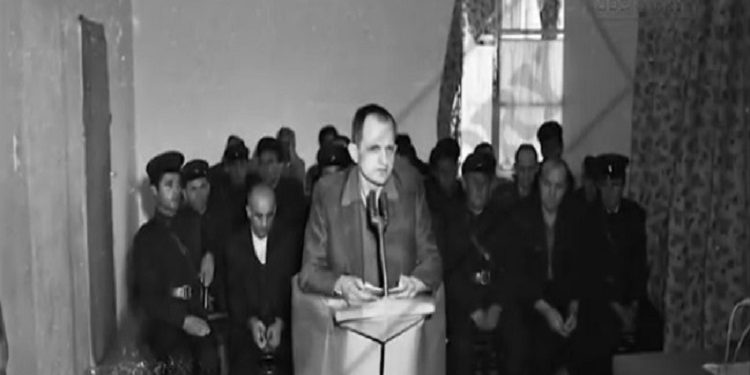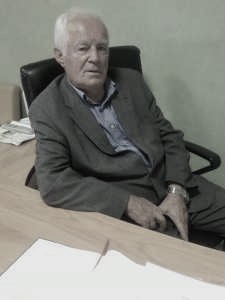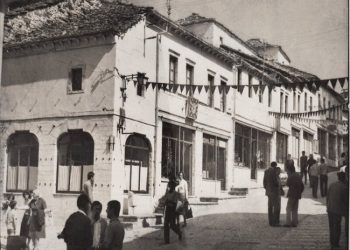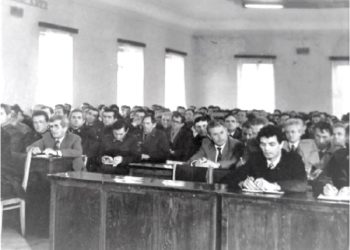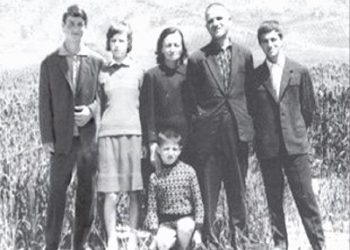By Dashnor Kaloçi
Part Eight
Memorie.al / From the end of November 1944, when he officially came to power, until his death in 1985, the communist dictator Enver Hoxha, wanting to resemble his idol, Joseph Visaranovic Stalin, and following his “path”, from time to time undertook purges in the senior leadership of the Albanian People’s Party, something that he had practically started in 1941, with Anastas Lula and Sadik Premte, continued with Koci Xoxe (and his group) in 1948-’49 and ended in 1981-’82, with the so-called “Hostile Group of Mehmet Shehu and Kadri Hazbiu”. In this time interval of more than four decades, as is now known, he eliminated almost all the founders of the Albanian Communist Party, members of the Political Bureau of the Central Committee of the Albanian People’s Party and the main leaders of the so-called “Anti-fascist National Liberation War”, so much so that from 1960 until the collapse of the communist regime in 1990, only Pilo Peristeri had escaped prison or exile, enjoying the privileges of a lifelong candidate of the Political Bureau and the function of director of the “Enver Hoxha” Autotractor Combine!
But, unlike what he had done until the beginning of the 70s, where Enver Hoxha’s “sword” had mainly fallen on the senior leadership of the CPSU (Koci Xoxe, Kristo Themelko, Sotir Vullkanim Ramadan Çitaku, Tuk Jakova, Bedri Spahiu, Liri Gega, Gjin Marku, Koço Tashko, Liri Belishova, etc.), whom he had accused of “deviators of the Party line” and had condemned as “traitors and enemies of the people”, in the mid-70s, the dictator Enver Hoxha began to attack several members of the Politburo, who also held ministerial positions, such as Abdyl Këllezi and Koço Theodhosi, accusing them of being “saboteurs” of the Socialist Economy!
And just as he had done with Beqir Balluku, Petrit Dume and Hito Çako, (who were sentenced to death and shot), where to prove “their hostile activity”, Enver Hoxha sentenced to prison and exile a large group of senior officers, as well as the so-called “Saboteur Group of the Economy”, which in addition to Këllez and Theodhos, also included the two ministers Kiço Ngjela and Vasil Kati, several senior officials of the Trade sector, directors and well-known specialists, such as Andrea Manço, Ahmet Jegeni, Bardhyl Frashëri, etc., as well as of the Oil sector, such as; directors, engineers and well-known specialists, such as; Filip Nashi, Beqir Alija, Koço Plaku, Milto Gjikopulli, Protoko Murati, Dhimitër Stefa, Jani Konomi, Nuredin Skrapari, etc.
As we will see in the documents in question, the investigative process against the so-called “Saboteur Group of the Economy”, which had been carried out by the Ministry of Interior and State Security, with fabricated accusations and evidence of false or obtained under torture, etc., continued the Supreme Court of the People’s Republic of Albania headed by Aran Çela, “channeling” the accusations also from the “legal” side, to “confirm” what Enver Hoxha had said in the Plenums of the Central Committee of the Albanian People’s Party, against Abdyl Këllez, Koço Theodhos, Kiço Ngjelë, Vasil Kati, etc.
As for all of the above, after the 90s, much has been said and written about all of these, both by members of those “groups”, their families, etc., etc., Memorie.al has secured the archival documents of the Supreme Court of the People’s Republic of Albania of that time and the former Presidium of the People’s Assembly, where the “Hostile Group of the Economy”, “Trade” and “Oil” were examined, which see the light of day for the first time, documents that we are publishing in several issues, along with photos and facsimiles relevant.
In the first and second parts of this series of articles, we are publishing documents concerning the former director of Makinaimport, Andrea Manço, originally from the village of Boboshticë in Korça, whose brother Todo Manço, for years had served as chief engineer and director of the Bulqiza chrome mine, and also for several legislatures in a row as a deputy of the People’s Assembly, who when he passed away on November 6, 1974, was given a magnificent funeral ceremony, with homage in the center of the capital, where, in addition to Enver Hoxha, the entire senior leadership of the Albanian People’s Party, headed by Prime Minister Mehmet Shehu, participated. While Todo Manço, (“Hero of Socialist Labor”) would be given all these honors, his brother, Andrea, about two years later, would be tortured in the cells of the State Security and sentenced to death, by shooting, as an “enemy of the people” and “foreign agency agent”, and his grave has not yet been found!
Continued from the previous issue
DECISION OF THE HIGH COURT PRESIDED BY ARANIT ÇELA, SENT TO THE PRESIDIUM OF THE PEOPLE’S ASSEMBLY, ON THE CONVICTION OF THE “ENEMIAL GROUP” IN THE OIL SECTOR, HEADED BY FILIP NASHI, BEQIR ALIJA, KOÇO PLAKU, MILTO DJIKOPULLI, ETC.
RELATION
PEOPLE’S REPUBLIC OF ALBANIA Tirana on 21.6.1976
SUPREME COURT
No.381
Presidium of the People’s Assembly
Tirana
PEOPLE’S REPUBLIC OF ALBANIA
HIGH COURT
No.12. Reg. Founders
No.13 of the decision
DECISION
IN THE NAME OF THE PEOPLE
The Supreme Court of the People’s Republic of Albania composed of:
President of the session: Eleni Selenica, President of the Supreme Court
Acting Judge of the session: Mitat Goskova
Acting Judge of the session: Fehmi Legreta
Assisted by the Secretary Sadik Mema, with the participation of the Prosecutor Sotiraq Samara, Deputy Prosecutor General, from 11-17.6.1976 considered in a closed court session, the criminal case No. 12 concerning the defendants:
Both of these hostile activities with a single final goal – the overthrow of the dictatorship of the proletariat, were carried out in the same period, they were coordinated.
It was fully proven that two of the members of this saboteur group, as early as 1960-1961, Milto Gjikopulli and Koço Plaku, were recruited and put into the service of Soviet Intelligence with the aim of carrying out sabotage in all directions of the Oil and Gas industry, a fact that proves not only the hostile activity of the Soviet revisionists towards our country, its predatory aims similar to those of the imperialists and especially American imperialism, but also that external and internal enemies strike both separately and together by coordinating and harmonizing their actions to weaken and overthrow the people’s power and socialism in our country, to restore capitalism.
Based on all the evidence administered during the examination of the case, the Court concludes that; The entire hostile – sabotaging activity of the group of defendants was carried out in cooperation, which is expressed in the unity of thoughts, in the unity of sabotaging actions using common methods and forms, and finally in the unity of goals – the weakening of the national economy and the country’s defense power, with the final goal of overthrowing the people’s government.
The trial against the sabotaging group led by the defendant Filip Nashi and with associates Beqir Alija, Koço Plaku, Protoko Murati, Milto Gjikopulli, Dhimitër Stefa, Jani Konomi and Nuredin Skrapari, as a continuation of the trial of the Party and the people, confirmed all the investigative data, the main directions of their sabotaging and hostile activity, the great political, ideological and economic damage that this activity has caused, and crystallized the extremely pronounced social danger of this hostile and sabotaging group and their criminal activity.
The investigation and trial data confirmed that the criminal sabotage activity of the sabotage group led by Filip Nashi and composed of his associates, the defendants Beqir Alija, Koço Plaku, Protoko Mrati, Milto Gjikopulli, Dhimitër Stefa, Jani Konomi and Nuredin Skrapari, was focused on the following areas:
Based on their goal, preparing suitable terrain for the imperialists, revisionists and world reaction, to pave the way for undermining the country’s defense and damaging the national economy as a whole, the saboteur group of defendants led by Filip Nashi, opposed in theory and in practice the Party’s line, its directives and government decisions for the development of the Oil and Gas industry.
Concretely, in their actions, which have supported and supported each other, they have sabotaged the implementation of the Decision of the Political Bureau of the Central Committee of the Party, No. 254 dated 10.11.1967, as well as the Decision of the Council of Ministers, No. 38 dated 5-6 March 1970, issued specifically for the development of the Oil and Gas industry.
Based on the goal of not discovering new oil and gas reserves, sabotaging the prospects of our country in this important sector of the economy, discrediting the decisions of the 6th Party Congress and the 5th Five-Year Plan, the defendants, together with their thoughts and actions, from the initial stage of studying and discovering oil and gas reserves, opposed the fundamental requirements of the Politburo’s highest decision regarding the performance of the entire necessary complex of geological and geophysical works.
All defendants claimed that in the direction of preparing high-quality structures and the necessary geological and geophysical complex, they sabotaged and that their goal was not to discover oil, sabotage the economy, weaken the country’s defense power, and overthrow the people’s government.
Thus, the defendant Filip Nashi pointed out the manipulation that was done to the elite of geologists, such as Beqar Alija, Protolo Murti, Koço Plaku, Milto Gjikopulli, Dhimitër Stefa, to award points to structures that were not prepared with the complex of geological-geophysical works.
He claimed that, apart from other persons, he himself was the instigator and pusher for awarding points without the preparation of the structures by the Institute, that; “I, – he declared, – acted in this way in order not to carry out the tasks of oil discovery, in order to sabotage the economy of the people’s power, dreaming of changing the situation”.
While the defendant Beqir Alija claimed that; “he did not agree with the Politburo Decision, which directed that no well should fall outside the structure and that; “the sabotage began immediately after the issuance of this decision”. These statements of the defendants Filip Nashi and Beqir Alija clearly indicate their main role in the sabotage activity developed in the Oil and Gas industry.
On the other hand, the defendants Milto Gjikopulli and Koço Plaku, giving explanations about the accusation, claimed that even when they designed wells themselves and approved the projects of other geologists, they were guided by the goal “to weaken the oil economy, to undermine it, with the aim of overthrowing the people’s government”.
The statements of the defendants, the statements of numerous witnesses and the data of the expert report, proved that a large number of structures and wells were attacked and drilled without being prepared with complex geological-geophysical works. 80% of the structures of those subjected to drilling, it is emphasized in the expert report, were unprepared and for the period 1970-1975.
As a result of the sabotage activity, out of 129 wells drilled in limestones and sandstones, with structural and exploration tasks, 59 fell outside the structure without hitting the limestones at all, 23 hit the object (limestones), but did not confirm the structure, three hit the limestones within the structure but with major changes from the project and only 7 wells fell into the structure.
For this sabotage activity, the degree of guilt of the defendants Filip Nashi and Beqir Alija, the first as the main instigator of this activity, while the second as the instigator and the main person who approved in the Scientific Council of the Institute, the attack on the structures and the drilling of wells without carrying out the complex of geological-geophysical works, is extremely high.
The degree of guilt of the defendant Protoko Murati, as head of the Geology-Geophysics sector at the Institute of Oil and Gas, is also great. The degree of guilt of the defendants Milto Gjikopulli and Koço Plaku is even greater, since they, as evidenced by the evidence and the full confession of the defendant Milto Gjikopulli, being also agents of Soviet Intelligence, acted with full conscience to carry out the tasks assigned by this enemy intelligence.
The degree of guilt of the defendant Dhimitër Stefa, who, as head of the survey group of the Kurvelesh area, with his direct actions, by submitting well projects without the complex of works, sabotaged the discovery of new resource sites in this area, where even more attacks on structures have been made. As a designer, the defendant Nuredin Skrapari has also given points without the complex of geological-geophysical works, but the degree of his guilt in this regard is smaller than that of the other defendants.
The defendants have also sabotaged in the areas of conducting geophysical works and especially seismic ones, spreading their reactionary and anti-scientific views that; “seismics does not give us anything, we have found oil even without seismic” and opposing the correct orientation of the government, that; “without geophysical works, not a single well should be given”, their sabotaging slogan; “let’s gain time, jump with courage”.
In this way, as stated by a number of witnesses, claimed by the defendants themselves and clarified by the expert report, the place and role of research geophysics and especially seismic, for the years 1970-1975, has been systematically ignored and abandoned, with premeditated criminal intent, that is, with the intent to sabotage.
Thus, as it results from the expert report, the defendants designed, promoted and approved wells only on the basis of surface surveys, on the basis of incomplete gravimetric works (when these were carried out), on the basis of pre-formed geological ideas and in flagrant contradiction with geophysical data, especially seismic ones or, in general, geological-geophysical ones, wells were given based on poor quality seismic data, interpreted according to pre-formed geological ideas, deep wells were promoted and approved without waiting for the final interpretation of the preliminary seismic works, without defending them in the technical council of geophysics and in the Scientific Council of the Institute.
50% of the structures that were subjected to research, it is stated in the export report, were not subjected to seismic studies during the years 1970-1975; 30% of them have been prepared with partial seismic and only 20% of them have been subjected to oil and gas exploration with conditional, unconditional and in some cases surface works. Seismic works in 1975 were lower than their level in 1961 when the material base was quite strengthened. Memorie.al






